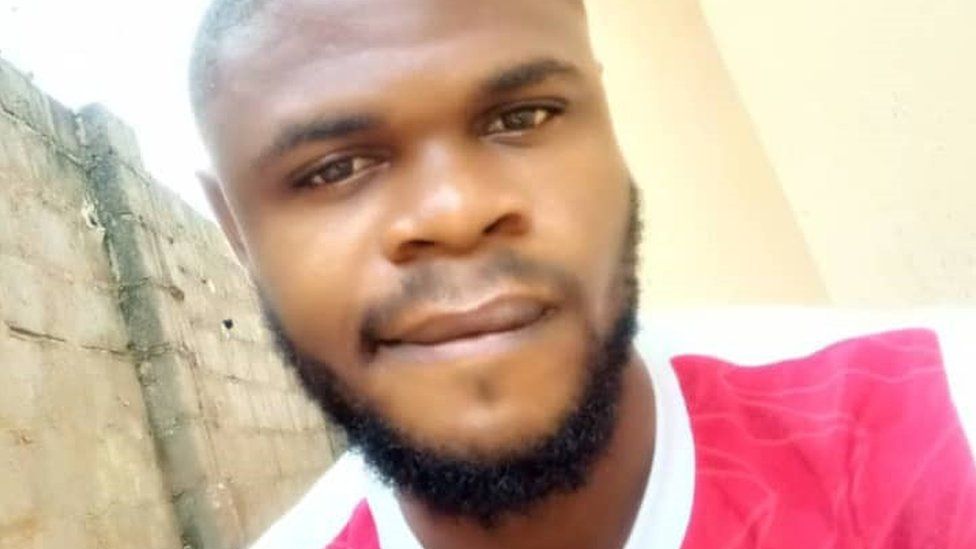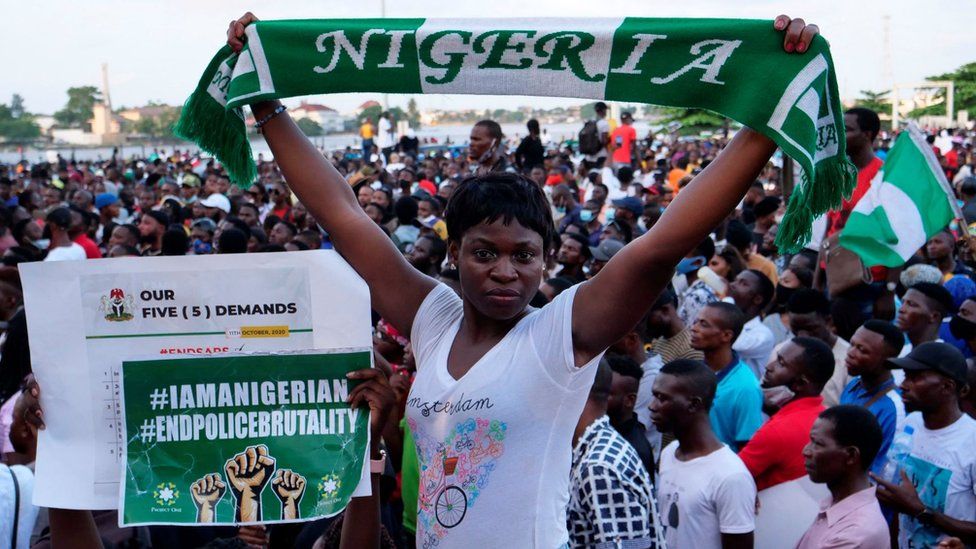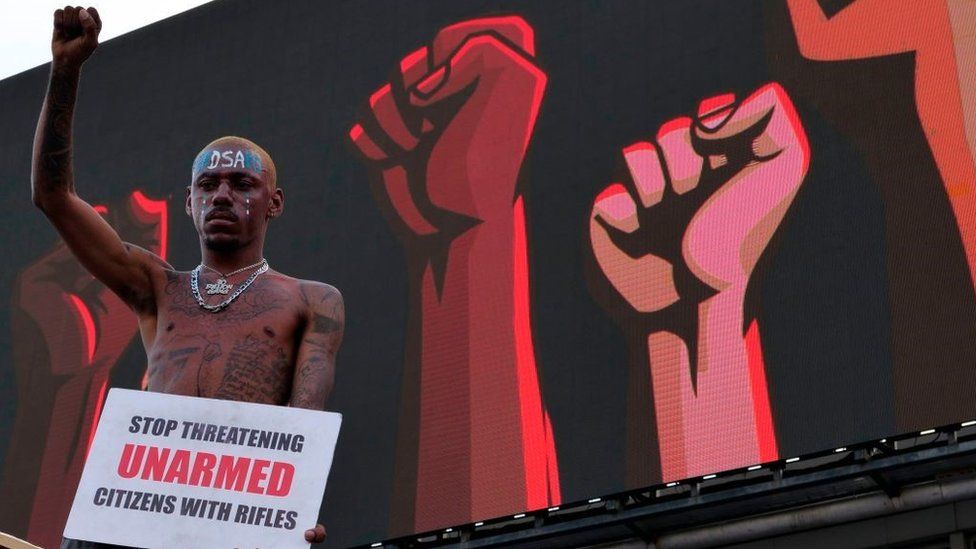Nigerian student shocked to see friend's body in anatomy class
1 hour ago
Enya Egbe (pictured) is still coming to terms with the loss of his friend
In our series of letters from African writers, Nigerian journalist and novelist Adaobi Tricia Nwaubani writes about the disturbing reality behind some of the "unclaimed" bodies sent to the country's medical schools.
Medical student Enya Egbe fled his anatomy class crying after being disturbed by the corpse he was asked to work on.
This was not the squeamish response of a naïve young man.
The 26-year-old still vividly recalls that Thursday afternoon seven years ago at Nigeria's University of Calabar, converging with fellow students around three tables with a cadaver laid out on each.
Minutes later, he screamed and ran.
The body his group had been about to dissect was that of Divine, his friend of more than seven years.
"We used to go clubbing together," he told me. "There were two bullet holes on the right side of his chest."
Oyifo Ana was one of the many students who ran out after Mr Egbe and found him weeping outside.
"Most of the cadavers we used in school had bullets in them. I felt so bad when I realised that some of the people may not be real criminals," Ms Ana said.
She added that early one morning she had seen a police van loaded with bloodied bodies at their medical school, which had a mortuary attached to it.
Mr Egbe sent a message to Divine's family who, it turned out, had been going to different police stations in search of their relative after he and three friends were arrested by security agents on their way back from a night out.
The family eventually managed to reclaim his body.
Nigerians last year staged massive protests to condemn police brutality
Mr Egbe's shocking discovery highlighted both the lack of corpses available in Nigeria for medical students and what can happen to victims of police violence.
Between the 16th and 19th Centuries, different laws in the UK granted the bodies of executed criminals to medical schools - a punishment that also advanced the cause of science.
In Nigeria, a current law hands "unclaimed bodies" in government mortuaries to medical schools. The state can also appropriate bodies of executed criminals, though the last execution took place in 2007.
More than 90% of the cadavers used in Nigerian medical schools are "criminals killed by shooting", according to 2011 research in the medical journal Clinical Anatomy.
In reality, this means they were suspects shot dead by security forces. Their estimated ages are between 20 and 40 years, 95% are male, and three out of four are from the lower socio-economic class. There are zero body donations.
"Nothing has changed 10 years later," said Emeka Anyanwu, a professor of anatomy at the University of Nigeria, who co-authored the study.
'Ambulance duty'
Last year, the Nigerian government set up judicial panels of inquiry in different states to investigate allegations of police brutality.
This was in response to the #EndSars protests sparked by the viral video of yet another young man allegedly shot dead by the police's Special Anti-Robbery Squad (Sars) in the southern state of Delta.
Many of those testifying before the panels have spoken of relatives arrested by security agents and never seen again.
The police have in most cases defended themselves by saying that those missing were armed robbers killed in an exchange of gunfire, while police spokesman Frank Mba told me he was not aware of any case where the police had dumped bodies with anatomy labs or mortuaries.
In written testimony presented to the judicial panel in Enugu state, 36-year-old trader Cheta Nnamani said he had assisted security agents to get rid of the bodies of those they had tortured or executed during his four months in the custody of Sars in 2009.
He said that one night, he was asked to load three corpses into a van, a task known in detention parlance as "ambulance duty".
The police then chained him inside and drove to the nearby University of Nigeria Teaching Hospital (UNTH), where Mr Nnamani offloaded the bodies. They were taken away by a mortuary attendant.
Mr Nnamani told me that he was later threatened with the same fate.
In the south-eastern town of Owerri, the privately-owned Aladinma Hospital Mortuary stopped accepting bodies of alleged criminals because the police rarely provided identification or notified relatives of the deceased.
This used to leave the mortuary stuck with the maintenance costs of the unclaimed bodies until every few years the government eventually granted permission for mass burials.
"Sometimes, the police try to strong-arm us into accepting bodies but we insist that they take them to a government hospital," said Ugonna Amamasi, the administrator of the mortuary
"Private mortuaries are not authorised to donate bodies to medical schools but government mortuaries can," he added.
A senior lawyer, Fred Onuobia, said relatives were entitled to collect the bodies of lawfully executed criminals.
"If no-one shows up after a certain length of time, the bodies are sent to teaching hospitals," the advocate said.
But the situation is worse with extrajudicial killings, as relatives never get to know about the deaths or are unable to locate the bodies, he said.
[img]http://c.files.bbci.co.uk/assets/f990957d-5723-4663-a6ff-2c1f83b69463[/img]
Divine's family managed to get some of the officers involved in his killing sacked"- Adaobi Tricia Nwaubani
Nigerian novelist
It was only by chance after all that the family of Mr Egbe's friend, Divine, was able to give him a proper burial.
Nigeria's association of anatomists is now lobbying for a change in the law that will ensure mortuaries obtain full historical records of bodies donated to schools, and also family consent.
It will also set out ways to encourage people to donate their bodies to medical science.
"There will be a lot of education and a lot of advocacy so people can see that if I donate my body, it will be for the good of the society," said the association's head, Olugbenga Ayannuga.
As for Mr Egbe, he was so traumatised by seeing his friend's body that he abandoned his studies for weeks, imagining Divine standing by the door each time he tried to enter the anatomy room.
He ended up graduating a year after his classmates, and now works in a hospital lab in Delta state.
Divine's family managed to get some of the officers involved in his killing sacked - scant justice but still more than that experienced by many other Nigerians whose loved ones were the victims of police violence and may also have ended up in medical schools around the country.
https://www.bbc.com/news/world-africa-57748122
Adaobi Tricia Nwaubani (Nigerian novelist)



Post a Comment